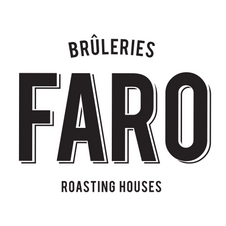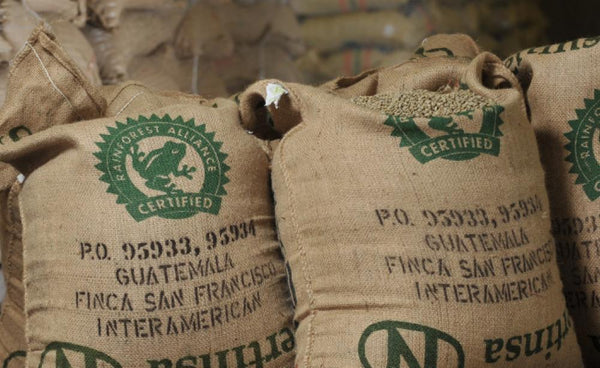Certifications
When integrating a certification, various aspects can be covered, whether environmental, social or economic. In the coffee sector, sustainability is framed in existing certification systems that cover both traditional and specialty markets. However, niche cafes are often not included in these systems, as the quality of the product allows them to sell for more than in the certification structure. Each certification system in the coffee sector has its purpose, procedures and position in the market. Note that coffee can also be certified under two or more certification systems, thus covering more than one market segment. The main coffee certification systems are:
- Rainforest Alliance (UTZ)
- Organic (ECOCERT)
- Fairtrade
- 4C (mainly Europe)
It is therefore important to have a variety of certifications to ensure that the maximum number of issues related to coffee production are covered (biodiversity, carbon neutrality, social factors, etc.)
ORGANIC
First, let's start by unraveling the biggest certification: organic. People often assume that organic is just a marketing term, but it's also a term with different legal definitions. Products bearing the organic seal are verified by government-accredited inspectors and require that the farms do not use synthetic pesticides, have a plan to avoid excessive erosion (a real problem with coffee plants) and either sufficiently spaced from non-organic farms on which non-organic fertilizers and pesticides will not float by the areas.
FAIRTRADE

It’s only the full phrase "Fairtrade Certified" that carries weight; "Fairtrade" on its own, without the label of an organization like Fairtrade International, means nothing. Fairtrade International is made up exclusively of cooperatives of small producers. The minimum price per pound for the farmer is $ 1.40 USD for non-organic produce, 1.70 $ USD for organic produce, plus a community development premium of 20 cents each.
RAINFOREST ALLIANCE
Rainforest Alliance is a certification provided by an NGO of the same name. Its objective is ecological and relies on the presence of shade (note that all coffee trees are more productive under the shade, so it is rather rare to find plants without shade since the tree would produce 30-50% less coffee cherries), clean waterways and a few other initiatives to minimize the negative impact on the environment. It is also a fairly decent protection against the exploitation of child labor. The problem is that, while the Rainforest Alliance is a real certification with real requirements, its specifications are not very… strict. Sometimes only 30% of the coffee in a package needs to have passed assembly for the package to be legally certified. This certification also does not require a minimum purchase price for coffee, or anything to ensure fairer wages for farmers. Rainforest certified coffee has therefore been widely criticized, but it is all in all better than nothing.
OTHER FACTORS
We have to be careful and make sure to optimize our choices even for uncertified purchases. For example, the carbon footprint linked to transport is not taken into account by the various certifications we have mentioned above. This is why at FARO, we prioritize importing coffee from Latin America instead of Asia or Africa.
We also really like working with Colombian coffee because of the FNC. Founded in 1927, the Federación Nacional de Cafeteros de Colombia (aka the National Federation of Coffee Growers, hence the abbreviation “FNC”) is an NGO that provides a wide variety of services and support to coffee growers in the country, regardless of their size, their land holdings or the volume of their production. The marketing arm of the FNC is developing campaigns to promote not only the international consumption of Colombian coffee, but also, more recently, the domestic consumption of specialty Colombian coffees. The FNC also guarantees a purchase price for any coffee grown in Colombia, which gives farmers some financial security: they have the option of finding private buyers or entering specialty markets, they can also offer their coffee to the FNC and receive a somewhat stable price. The organization’s scientific branch, Cenicafé, is dedicated to research, development, dissemination and support across the country. A large extension service employing more than 1,500 field agents is deployed to meet and consult with farmers on soil management, processing techniques, variety selection, disease prevention and treatment, and other agricultural aspects of coffee culture. A tax is imposed on all coffee exports to fund this work as well as other provisions and protections offered by FNC, regardless of a grower's participation or use of FNC services, market and programs.

At Faro, we also collaborate with one of the best cooperatives in the coffee world: Costa Rica Coope Tarrazu. It has created systems that reduce water use by 95% for the treatment of washed coffee (fermentation). The farmers also own the sorting center, a grocery store, collection points, gas stations and a restaurant in the production area.
WHAT ABOUT INNOVATION?
Why aren't the best coffees (usually) certified Fairtrade, Organic, or Rainforest? The answer to this question is very logical and responds to an economic mechanism: small farmers who invest in their plants, in the processing of coffee (after picking), and who produce coffee with high added value do not need the structures resulting from the various certifications since they largely exceed - from 100% to 1000% - the market values. In reality, these farmers don't even look at the market to price their product.
DIRECT TRADE
Direct trade is not a purchasing model governed by a certifier, such as the Fairtrade certification for example. It is a term used by roasters to refer to purchases that are made the closest to the producer possible, so roasters often go on field trips to meet the farmers, connect with local communities and ensures that you have a unique product.
Be careful, the Direct Trade label does not mean anything unless it is done for real!



